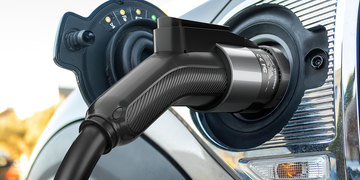How much does it cost to charge an EV at a power station? As electric vehicles (EVs) gain popularity, understanding the cost associated with charging them becomes essential for both current and prospective owners. Charging an EV at a power station involves various factors that contribute to the overall expense. In this article, we’ll explore the key factors that impact the cost of charging an electric vehicle and how much it costs to charge your vehicle.
Charging Rates and Cost Structures
The cost of charging an electric vehicle at a power station primarily depends on the charging rate and the pricing structure adopted by the charging station. Charging stations generally offer different levels of charging: Level 1 (standard household outlets), Level 2 (240-volt charging stations), and Level 3 (DC fast charging stations). Each level comes with its own charging speed, affecting the overall cost.
Level 1 charging is typically the slowest and is often free or very low-cost, making it suitable for overnight charging at home. Level 2 charging is more common at public charging stations, shopping centers, and workplaces, with varying costs depending on the location and provider. Level 3 charging, or fast charging, is the quickest option but tends to be more expensive due to the infrastructure's higher installation and maintenance costs.
Pricing Models
Charging stations may adopt different pricing models, contributing to the overall cost. Common models include pay-per-use, subscription-based, and time-based pricing. Pay-per-use involves a set cost per kilowatt-hour (kWh) consumed, while subscription-based models often include a monthly fee in addition to reduced per-kWh rates. Time-based pricing charges users based on the time spent connected to the charging station, regardless of the amount of energy consumed.
Time-of-Use Pricing
Some charging stations implement time-of-use pricing, where electricity rates vary based on the time of day. Charging during off-peak hours is often more economical, as electricity costs tend to be lower during periods of reduced demand. EV owners can take advantage of time-of-use pricing to optimize their charging costs by scheduling charging sessions during low-demand periods.
Government Incentives and Rebates
Various governments worldwide offer incentives and rebates to promote the adoption of electric vehicles. These incentives may include tax credits, rebates, or discounted electricity rates for EV owners. It's crucial for consumers to research and take advantage of available incentives, as they can significantly reduce the overall cost of charging an electric vehicle.
How much does it cost to charge an EV at a power station?
Calculating the cost of charging an electric vehicle, at home and on the road, can be complicated. For the four out of five new-car buyers who can charge at home, often overnight, the cost per mile is virtually always cheaper than the cost of gasoline for a similar vehicle. It's tougher for apartment dwellers, who may pay a variety of rates to companies that operate charging stations in shared parking areas. For DC fast-charging, which a driver will likely want to use on road trips that are longer than an EV's range, prices vary, but are often roughly in line with gasoline prices.
Because of these factors, the price of a full charge can vary considerably. For a Tesla Model Y, currently the bestselling EV, it could cost as little as $9 or as much as $40, depending on whether you're charging at home or at a far more expensive Level 3 fast-charger.

Rates of electric charging fluctuate
Costs to charge an electric car aren’t posted on roadside billboards but they can surge and fall just like gas prices, and the variety of available methods for EV charging means it can be hard to generalize the cost of a single battery top-up.
For instance: the going rate for a kilowatt-hour (kWh) of electricity for residential customers in the United States was $0.1585 in March 2023. But that’s just an average rate — depending on where you live, your electricity provider, and the time of day you charge the car, your costs may be higher or lower. Pricing for public charging stations (or stations available to the public but operated by private charging networks) can be even more opaque. Oftentimes you’ll pay a set rate per kWh of energy, just like at home. There are also times when the charges could vary depending on the speed at which the energy is delivered or how long you’re plugged in. And in some cases, the price is set by the businesses that own the land the stations are on, not by the charging network that administers the stations.
Charging depends on battery capacity
The amount of energy a battery can store varies from model to model. An extended-range 2023 Ford Mustang Mach-E has up to 72 kWh of usable battery capacity, for example, and the extended-range 2023 Ford F-150 Lightning holds up to 131 kWh. At average rates, if you were to add 100 kWh of energy while charging an EV at home, you’d spend $15.85 and get a maximum of about 300 miles of driving range depending on the efficiency of your EV. But if you were to replenish 100 kWh using an Electrify America fast-charging station, the cost to charge an electric car is around $0.48 per kWh, or $48 total. Tesla asks for as low as $0.28 per kWh at certain Supercharging stations (rates vary locally), which would mean $28 for this hypothetical charge.
Ev charging vs fuel costs
The wide range of electricity prices means that driving an EV isn’t always cheaper than driving a gas car. On a per-mile basis, the cost to fuel a 2023 Volkswagen ID.4 First Edition for one mile at highway speeds would be about $0.06 if you charged at home, or around $0.18 at an Electrify America fast charger. It would cost approximately $0.12 to power the similarly-sized, gas-powered Volkswagen Tiguan for a mile on the highway, assuming a gallon of regular gasoline costs $3.68, the U.S. average in June 2023.
Like so many things in life, the answer to, How much does it cost to charge an EV at a power station?, ‘It depends’. EV owners tend to use their cars differently than owners of gas-powered cars, taking shorter trips less frequently. If switching to an EV also changes your driving habits, the difference in your spending on fuel compared with a gas- or diesel-powered car will vary, too. Other behaviors can influence cost of ownership, as well — relying on DC fast charging isn’t just more expensive than charging at home, it can also shorten the life of your EV’s lithium-ion battery, and over time might reduce your car’s maximum driving range. It’s a complicated picture, and one that may change as EVs and charging technology mature. For now, driving an EV will save on emissions, but it’ll only save you fuel money if you plug in at home.
The cost of charging an electric vehicle at a power station is influenced by multiple factors, including charging rate, pricing models, location, network providers, time-of-use pricing, and government incentives. EV owners should carefully consider these elements to optimize their charging expenses and make informed decisions about when and where to charge their vehicles. As the electric vehicle infrastructure continues to evolve, staying informed about charging costs will empower consumers to make sustainable and cost-effective choices for their electric vehicles.





